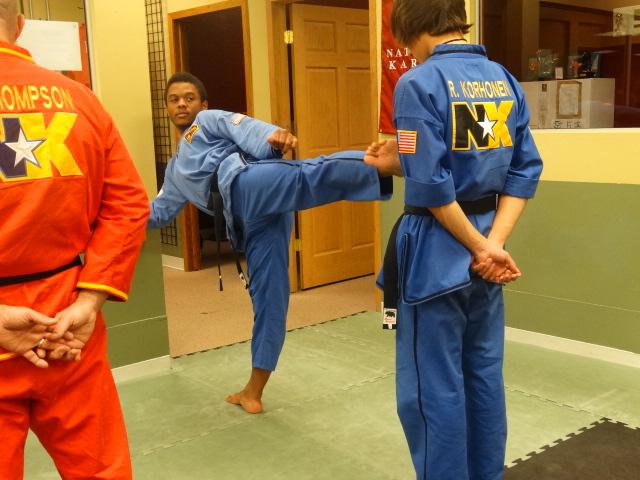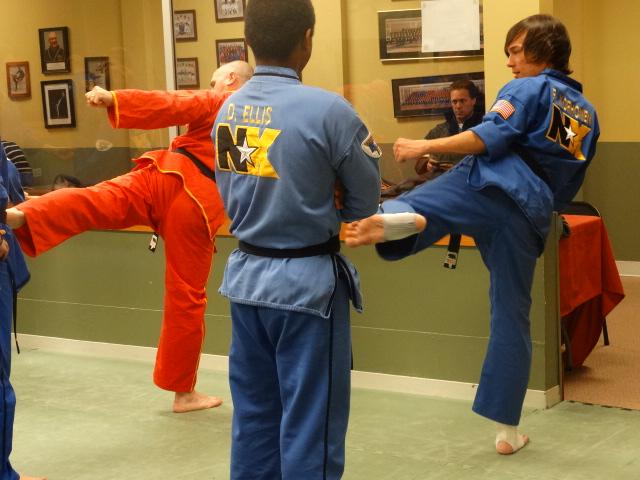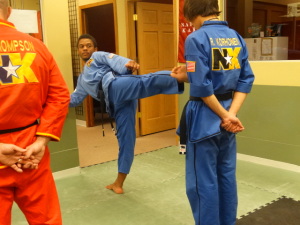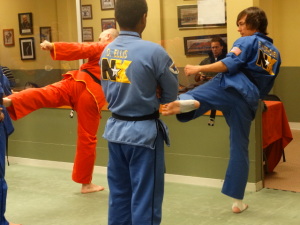HHS’ very own Karate Kids
Nov 24, 2014
Before earning their black belt, a karate student must earn 14 belts and pass a series of tests consisting of moves, kicks, and defense stances that are associated with each belt.
Brothers Bryan and Robb Korhonen, juniors, have participated in martial arts for over seven years, Bryan beginning his training late 2007 and Robb late 2008. For them, karate is a mental and physical sport that sets them apart from other athletes at HHS.
“[Karate] keeps me entertained,” Robb said. “Bryan started fighting first and after watching him fight I started to do it too. It kind of stuck since then. It just became a normal routine.”
In 2012, Bryan earned his black belt from the National Karate Academy of Martial Arts. Robb followed in 2013.
“Getting my black belt was a great experience, but I don’t have plans of stopping. I want to get my second degree in the next six months. Right now I’m keeping an open mind and focusing on continuing,” Bryan said.
The Korhonens are coached by senseis Hamed Firouzi and Adam Jensen. Firouzi is the head director of Hopkins National Karate. He holds the rank of fourth degree black belt and is a member of Wasuru, the number one ranked fighting team in the nation. Jensen is the assistant director and holds the rank of second degree black belt.
Besides the physical components of the black belt, Jensen believes there is a deeper meaning to a student earning their belt.
“The black belt is a symbol of dedication and consistency,” Jensen said. “You have to put in a lot of time. You need to be persistent. Bryan and Robb have all the common denominators that earned them the black belt.”
The brothers have brought what they’ve learned from their teachers to their practices and matches.
“Whenever I’m fighting, I tell myself to stay focused on my opponent and not overthink my movement. It’s important that I’m the most disciplined fighter on the mat,” Bryan said. “[When I lose] I say some words that I’m not too proud of, but I know that I can prove myself and my skills the next time I fight.”
Jensen said he’s seen both growth and maturity in the brothers since their first lesson five years ago.
“There’s a lot of dedication I see them give to the sport. Any athlete can do that, but it’s the discipline that they put on themselves that make them consistent, skilled fighters. They’ve come from students to technical martial artists,” Jensen said.
For Millie Wiesner, junior, karate is a sport that brings out the individuality in a martial artist.
“I like being part of a team, but it’s more competition against yourself rather than others,” Wiesner said. “When you compete it’s about proving yourself.”
Wiesner has participated in karate for nine years. She currently has a brown belt with a black stripe, one belt away from earning her black belt. She hopes to have her black belt next November.
“To earn a black belt you have to want it. You need to be persistent,” Wiesner said. “You can go at your own pace, but remember you have all the time in the world to earn it.”
Besides competing in events, Bryan and Robb Korhonen both participate as teachers at the National Karate Academy for younger students throughout the week. Alongside their senseis, Robb teaches Saturday mornings and Bryan on Tuesday nights.
“The academy is most proud of our teaching methods,” Jensen said. “Putting yourself out there shows how much you can represent yourself. Both brothers have set a good example of this. It puts them in the spotlight.”
The brothers agree that working for the black belt was not easy, and it is the first step in a long process to become a sensei, or martial arts teacher. For the Korhonens, the hard work is worth it in order to reach their goals.
“As an athlete, you have to be stubborn,” Bryan said. “I get hit once or twice, but I don’t give up. If you work long and hard enough, you will eventually get there.”




